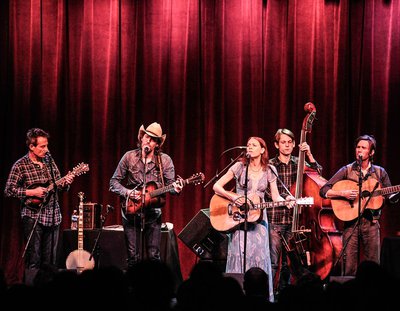
Among guitarists, if not across the wide world, Dave Rawlings is recognized as a stylist of the highest order, a folk traditionalist who is also a supreme innovator. For evidence of what this man can do with his 1935 arch-top Epiphone, witness “Revelator,” the first track on 2001’s Time (The Revelator) by singer and songwriter Gillian Welch, with whom Rawlings frequently collaborates. Technical finesse and searing passion twine into every note, until it seems Rawlings is channeling time itself — the endless surge of intimate, painful moments that weaves a lifetime.
Alongside his work with Welch, Rawlings also has the Dave Rawlings Machine, an outfit that includes Welch, as well as folk singer Willie Watson, Paul Kowert of the Punch Brothers and John Paul Jones of a little band called Led Zeppelin. “We’ve had a good time with this lineup,” Rawlings recently told EW by phone. “All of those people are vastly overqualified to be playing with me,” he adds with a laugh.
When pressed, Rawlings — whose songwriting moves gracefully between the sharps and valleys of Appalachian croon, bluegrass clomp and folk balladry — describes his music as Americana, and he is politely amused when asked to analyze the recent surge of interest in traditional roots music. “This has always been what Gillian and I have done,” he says. “I think this stuff is a little bit cyclical as to when it finds its way into the public eye. Those sorts of music and melodies and stories, they don’t go away.”
New styles of music, Rawlings continues, are driven by new technologies, and one of the appeals of the folk genre is that it can take such change and innovation and “fold it back into itself.” And Rawlings himself is one of such artists who continues to push the form in new directions, creating heartland music that is at once familiar and disarming.
“There are certain kinds of musical notes and sounds that appeal to me, and I’ve always tried to explore those in music,” he says, indicating that, for him, that nexus of creativity is located at the intersection of the personal and the formal. “Instead of trying to block that stuff, that’s where you end up putting yourself into the music,” he says of pushing boundaries of tradition. “It’s always a good idea to try to nurture it. You do it for yourself and you do it for the audience a the same time.”
Dave Rawlings Machine plays 8 pm Saturday, Sept. 27, at McDonald Theatre; $25 adv., $30 door. — Rick Levin